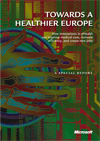Article of the Month!
 How innovations in eHealth can improve medical care, increase efficiency, and create new jobs.
How innovations in eHealth can improve medical care, increase efficiency, and create new jobs.Developed economies are already finding it hard to maintain standards of healthcare on existing budgets. Now payers are facing a huge dose of extra cost as, building on advances in biotechnology, pharmaceuticals, imaging, diagnostics and other fields, medical technology is delivering the potential for new treatments and diagnostics. eHealth - the application of information and communications technologies to the healthcare sector - stands out as a way to improve service and raise efficiency. As EU Health Commissioner Androulla Vassiliou noted in December 2008: "Investment in health pays future dividends".
The problems are big, of course. A Europe that should be celebrating the increasing life span of its citizens finds itself preoccupied with the cost of caring for an ageing population. By 2050, a third of the population will be over 60, an increase of 44 per cent over 2006. The number over 80 years of age will increase by 180 per cent. And the prevalence of most chronic conditions increases with age. Cancer and cardiovascular disease in the over-65s account for three-quarters of deaths across Europe. Demographic change is now combining with a recession that seems certain to threaten healthcare budgets, putting vulnerable groups at greater risk.
Download Towards a Healthier Europe White Paper (.pdf, 4.954 KB).
Download from the eHealthNews.EU Portal's mirror: Towards a Healthier Europe White Paper (.pdf, 4.954 KB).
For further information, please visit:
http://www.euinnovationday.com
Related news articles: